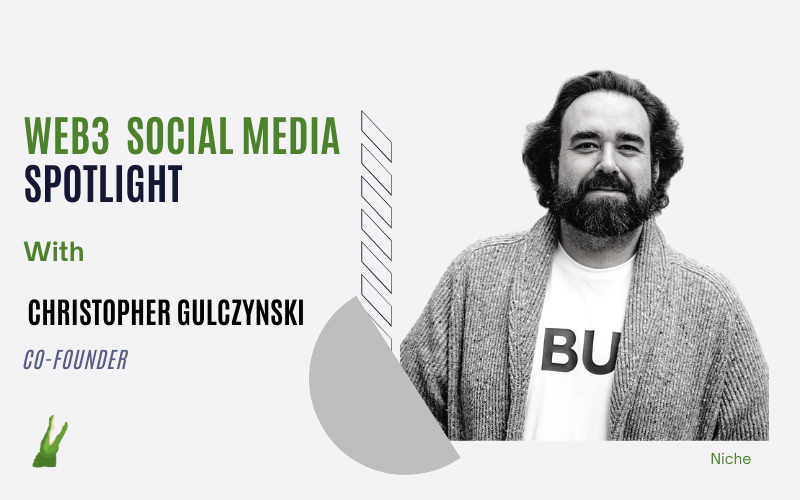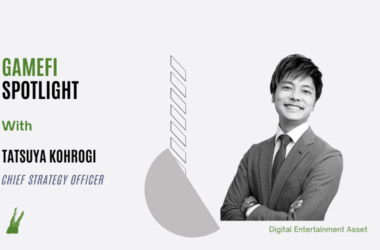When it comes to building communities and fan engagement, many founders are turning to Web3 and NFTs to connect users with their favourite talents, be it in sports, entertainment, or art.
While most fan engagement products come in the form of NFT marketplaces, some people have taken this one step further by creating Web3 social media platforms that allow creators to sell NFT membership passes to community-owned interest-based networks or clubs. One such example is decentralized Web3 social media platform, Niche.
Co-founded by a former senior engineering manager at Facebook, Zaven Nahapetyan, and Christopher Gulczynski, co-creator of Bumble and patented co-inventor of Tinder’s famed “swipe” feature, Niche is an ad-free social media platform that claims to never have to sell user data to generate revenue.
As the company is building towards a public launch early next year, we speak to Christopher Gulzynski to find out how members can own the interest-based clubs on the platform and whether Web3-based dating platforms could be successful.
Please tell us about yourself and the story behind Niche.
Over the last decade, I’ve focused my career on connecting people. I’m fascinated by what brings people together and the social architecture of those networks — Niche is a further extension of that interest. I’m combining my past design and product experience with a compulsion to redesign the way we connect in a digital space to more closely resemble how we do it IRL.
What piqued your interest in the NFT space and where did you first hear about it?
The technology of attaching a digital record to a unique object is fascinating. I think all the pictures of monkeys and what-not are a bunch of get-rich-quick schemes, though. The “art” isn’t compelling, the prices are/were inflated beyond all reasonable comprehension and I think it’s had an overall negative impact on an otherwise ingenious technology. NFTs are the future of ownership in my opinion.
How does Niche help Web2 social media users understand Web3?
Web3 is a collection of technologies that will rewrite the way we do things. The adoption of that promise comes down to how people interface with it. Currently, that interface is with DAOs, NFT drops, OpenSea, Discord and a string of other centralized services that are prohibitive to the average Web 2.0 “user”. Niche provides a platform that leverages that Web3 collection of technology to bring value to everyday people without the barriers currently preventing mass adoption
What is Niche’s target demographic and why? How can Niche tackle social media burnout that Web2 users experience?
Anyone who uses social media. Our connections to each other have been co-opted for ad sales. That’s how they make money. They use what you post to drive ad sales, so it’s natural they want you to produce “viral” content to get as many eyeballs on it as possible to make as many ad impressions as possible. This inherently leads to crappy connections, the proliferation of misinformation, and can be easily manipulated to increase ad sales. It’s having a measurable negative effect on people’s mental health and society as a whole.
Niche is switching that incentive structure away from making money for large tech companies with your content and instead, creating content that you own and adds to the value of your communities. When you own your content and your communities, you control the value of it as well
While Niche helps creators/community owners generate revenue via NFT sales, what do community members get out of it besides fan engagement? How do members “own” the interest-based clubs?
You’re “buying into” an interest or talent or artist. They’re buying into a community where they have agency over what happens, inclusion in exclusive content and events and all the inside knowledge and communication inside. These interests already define you; everyone is looking for their communities but the connections are being gatekept by web 2.0 companies.
How does Niche monetize?
We’re not a platform for “NFT sales”. We’re utilizing unique NFTs as membership cards for clubs. Those memberships can be bought and sold on an exchange powered by the Niche Protocol Token. We’ll take small fees on the exchange conversion as well as fees for certain clubs in the future. This lets us never have to sell user data for ads
What do you think about the current state of the NFT market?
I hope all the speculation comes to an end. The pragmatic applications of NFTs are far more valuable than a picture of a monkey
What can users look forward to from Niche this year?
We’re busy building towards an enhanced beta later this year for larger communities with established content creators and community leaders. We’re ultimately building towards a fully on-chain public launch early next year
What are the most challenging aspects of your role at Niche and how do you overcome these challenges?
Starting up your own company is hard. Being a startup CEO is hard. Raising money is hard. Otherwise everyone would do it
What are some of the most important lessons you’ve learned during your time at Bumble and how are you applying them to your role at Niche?
Consumer behavior is the same whether it’s web 1, 2, 3… or whatever’s next. People are people and they act predictably in certain controlled environments. Everyone wants to belong. Aside from food clothing and shelter, it’s our most intimate drive. I’ve learned better, more efficient ways to connect people over the years – and doing that never gets old for me
Do you think NFT/Web3-based dating platforms could be successful?
HELL YES! I hope the first Web3 dating community lives on Niche, too. Doing geo-based proofs and a bunch of other exciting stuff will let a whole new generation of dating apps come up. I’m excited to see what comes of it
Any other NFT-related industry issue you would like to talk about?
I think it’s important to realize the moment we’re in. The last iteration gave us Amazon and Facebook and Twitter – what’s happening here is going to bring in a whole new era of tech. And it’s so much bigger than NFT drops or Apes or whatever. That’s just proof of concept. The real power of this tech will come when it’s ubiquitous – when it’s invisible. When everything has an NFT attached to it it’ll just be the way we represent ownership. I’m looking forward to getting there.
Stay up to date:





